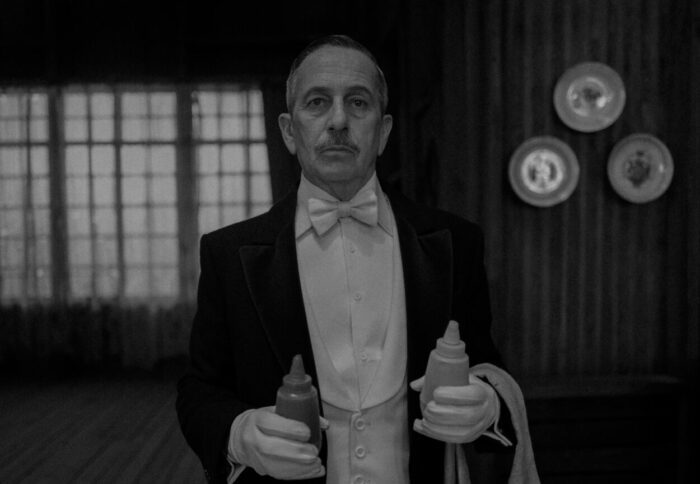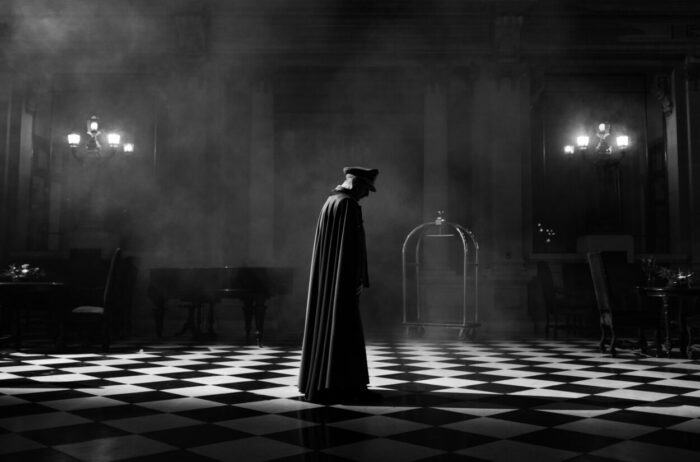In the last few years, Chilean filmmaker Pablo Larrain has marked himself out in my eyes as one of the premiere filmmakers of our age. With films like the uncompromisingly erotic Ema, the thoughtful, radical drama The Club, the probing, journalistic thriller No, the baroque tragedy Jackie, and his masterpiece, the ravishing, hypnotic character piece Spencer, Larrain has proven himself one of the most interesting and provocative filmmakers around. So when news first materialized about his latest work, a satirical gothic horror wherein the Chilean dictator Augusto Pinochet is reimagined as a gouty, morose vampire and patriarch of a squabbling family of cosseted ghouls, and with black-and-white cinematography by the great Edward Lachmann no less, it rapidly shot to the front of my must-see list. So, it’s with a heavy heart that I must admit, that from such tantalizing and audacious material, Larrain has spun the first major dud of his catalog.
The Netflix-backed film posits an audacious and provocative premise, following Augusto Pinochet (Jaime Vadell) after his supposed death, revealing that he was in actuality, a centuries old vampire who faked his death to escape justice and is now living on a remote, windswept island with his small household. Yet, fatigued with his long life and a forever tarnished legacy (he can handle being called a murderer he says, but a thief, that shame he will not bear), he has resolved to stop drinking blood and let himself die. To which end, his greedy family has materialized to claim their share of his fortune, if only they can find it. Like I say, a fun premise and one that should leave itself open to a lot of humor and a lot of horror, but where El Conde could go with it is a hard question to answer and it seems Larrain and his co-writer Guillermo Calderon were stumped by it. After a very enjoyable, amusingly narrated and handsomely mounted but in hindsight, under-developed prologue relating the backstory of how Pinochet came to develop his loathing for socialists, anarchists and all revolutionaries, and some deliciously macabre scenes of predation, El Conde just starts spinning its wheels, telling the same familiar story of vile, vulgar rich people, with no sense of insight and barely any wit.

There’s been no shortage of dramas, many emerging from South America, about the nature of evil, the machinations of dictatorships and the legacy of national trauma left in their wake. Some have been more rewarding than others, but some of my favorites have in fact been directed by Larrain. The Club in particular bears a lot of similarities to El Conde, in their remote rural locations, themes of Catholicism, guilt and loss of esteem, following communities of aging monsters and men wrestling with their shame, the violence of their actions, their hate and their egos. Both films also take advantage of an outsider coming and interviewing each of them, giving them opportunities to defend themselves and often, in so doing, to reveal their hatefulness. The Club portrays a much more nuanced and human sample though, with its disgraced and exiled priests having committed a variety of sins, most of them loathsome, some more tragic. With El Conde, basically everyone you will see onscreen is an unrepentant, irredeemable monster, with the curious exception of Carmencita (Paula Luchsinger) a mathematically gifted nun dispatched to the Count’s stronghold to help manage his finances and recover his ill gotten gains.
What is indisputably the film’s best moment belongs to Luchsinger. It would be a spoiler to describe it in any detail, but her character experiences a sort of physical and spiritual awakening near the film’s end which is expressed in one of the most beautiful sequences of film to come out in years. That I am unable to recommend El Conde on the strength of it alone is testament to what a wearying mess the rest of it is. It’s an astonishing sequence and testament to the audacity of Larrain’s vision and to the unparalleled skill of cinematographer Edward Lachmann, yet within the context of the unfocused, near-meaningless narrative that El Conde is weaving, the scene is a virtual non-sequitur, coming from and going to nowhere. It’s the most frustrating sequence in El Conde because it is the best by far. The rest of Luchsinger’s screen time she spends cryptically interrogating and fawning over the Pinochet extended family, backhandedly insulting and accusing them with an ingratiating grin while they nod along, both of them in apparent ignorance that one has just accurately called the other a monster.

The film does play a few amusing cards scattered throughout its runtime, but rare is it that any of them actually go anywhere rewarding. Each of its subplots eventuates into an anticlimactic nothing, and with neither coherent and entertaining characters nor any fresh insights into the nature of such people, the film winds up feeling like a dispiritingly shallow exercise in beautiful images, many of which are sapped of their meaning by the narrative and not enriched by it. There are some breathtaking moments in El Conde, Larrain’s skills as a metteur en scene continue to flourish, but they’re lost in a rambling, uneven and obtuse film that has little to say and is in no haste to spit it out either.



